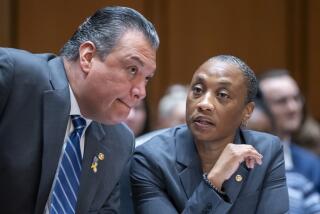Senate’s odd couple times six
WASHINGTON — The vote was close. A cluster of senators from both parties, authors of the immigration bill under debate, hovered over the clerk tallying the votes on an amendment that could bring down their fragile compromise legislation.
At 45 to 45, Arizona’s Jon Kyl, the lead Republican architect of the bill, put his hand to his chin. At 48 to 45, he crossed his arms and bit his lip. Ken Salazar, the Colorado Democrat who helped write the bill, leaned in.
The count stopped: 49 to 48. The amendment had passed, and their bill looked doomed. The bipartisan team sprang into action.
Kyl shot across the room to urge two Republicans still in the chamber to switch their votes. Edward M. Kennedy (D-Mass.) targeted Democrat Daniel K. Akaka of Hawaii, who listened, hesitated as Kyl drew close, then gestured to the clerk to change his vote.
In the center of the room, Salazar and Dianne Feinstein (D-Calif.) kept their eyes locked on the clerk until he called out the new tally: 48 to 49.
They had won.
In deeply divided Washington, the coalition behind the Senate immigration bill is unusual and -- so far -- unusually effective. The lawmakers, who span the political spectrum from deeply conservative to passionately liberal, spent hundreds of hours together in Senate conference rooms writing the 628-page immigration bill, phrase by painstaking phrase.
They endured stony silence and denunciations shouted by colleagues. Some members of the coalition defected, unsettled by the final bill, but a dozen stuck with it. At a time of abrasive partisanship, they forged a compromise on one of the most contentious issues of the day.
That commitment will be tested this week as other senators target the “grand bargain” at the heart of the bill: Democrats get a path to legal status for 12 million illegal immigrants; Republicans get a new way to award green cards that tilts toward skilled and educated immigrants.
The 12 senators, who have dubbed themselves the “grand bargainers” and are evenly divided by party, swore a rare bipartisan blood oath and promised to defend that trade-off from amendments. If either side of the trade-off crumbled, members said their coalition would too, and with it a bill widely seen as the last chance for years to fix a broken immigration system.
“If we had not gotten together as Republicans and Democrats to develop this bipartisan consensus,” Kyl said, “we can be assured that there would not be a bill passed this year and probably not next year.”
Led by an odd couple
With a full palette of personalities and political leanings, the coalition is an unlikely team with an even unlikelier pair of leaders.
Kyl, 65, has a precise, lawyerly mien. A solid conservative, he’s intense, quiet and prefers policy over the flash of politics. He can be stubborn and flare into impatience when asked a question he considers stupid.
Kennedy, the lead Democrat, is a liberal’s liberal. A silver-maned political lion elected to the Senate in 1962, the garrulous 75-year-old can work the levers of Congress as well as he works a room. When things don’t go his way, he’s not above a display of fiery bombast, delivered full-volume in a Boston brogue that seems to vibrate the Senate chamber.
Like many odd couples, Kyl and Kennedy -- indeed, the coalition as a whole -- had a matchmaker: the White House.
Homeland Security Secretary Michael Chertoff and Commerce Secretary Carlos M. Gutierrez began meeting with Republicans in January to see whether they could develop a consensus on immigration. In particular, they courted Georgia’s Johnny Isakson and Saxby Chambliss, both of whom opposed last year’s Senate immigration bill.
Chertoff and Gutierrez also met with senators who had played a prominent role in shaping that legislation, including Lindsey Graham (R-S.C.) and Arlen Specter (R-Pa.), who supported the final version of the bill, and Kyl and John Cornyn (R-Texas), who had not.
The Cabinet officials listened, cajoled and prodded.
They sought out Kennedy too, testing his parameters for a bill.
When the sides finally began negotiating in early April, they sat down for three or four hours a day, three days a week, for seven weeks.
“There were moments when I thought the talks would never end,” Isakson said.
Over bottles of mineral water in a wood-paneled suite in the Dirksen Senate Office Building, senators would start with a four- or five-page outline of general concepts and work down to tediously granular specifics: How would they certify a worker’s legal status? What were the implications of doing that? How would they actually set up a system in the time frame they had marked?
Those sessions forged a bond that Chambliss, who has served in Congress for 13 years, calls “absolutely unusual.”
“You’ve got some ultraliberals and some ultraconservatives and some middle-of-the-road folks,” he said, “and we’ve got a central consensus plan that not everybody is going to be happy with. That tells me the Senate is working the way it’s supposed to.”
Rough patches
In the final days of talks in mid-May, when it wasn’t clear whether the senators could produce a bill, the lawmakers became visibly tense. Kyl and Chertoff conferred shoulder to shoulder in the hallway before sessions. Isakson and Chambliss took breaks together, disappearing into the men’s room. Robert Menendez (D-N.J.), who eventually quit the group, often left scowling. Mel Martinez (R-Fla.), usually happy to talk to reporters, shot by, waving them off.
“There was yelling,” said a Republican aide, “but no one ever walked out of the room.”
Tempers often flared when lawmakers who didn’t regularly attend the meetings showed up with requests. Richard J. Durbin (D-Ill.) came to one and irritated Republicans by demanding that they include the Dream Act, which gives illegal immigrant children a way to earn citizenship.
“The Republicans were, sort of, ‘You haven’t been in these meetings!’ ” said the aide, who, like other Senate staff interviewed, asked not to be identified because they weren’t authorized to speak about the negotiations.
Other aides noted the stark contrast between the two leaders. “Kennedy’s negotiating style is to roar. Members would say, ‘OK, Ted,’ and then they would all carry on,” said another Republican aide. Kyl, who recently endured a close election that hinged in part on immigration, tended to “throw down the hammer and refuse to budge,” a Democratic aide said.
But the personalities in the room were a large part of the reason the group overcame the rough patches. “Specter was great as the old hand,” said a third Republican aide. “He has a great relationship with Kennedy -- he was really good at ratcheting down concerns.”
Other lawmakers consistently singled out two as bridge-builders: Salazar, a quiet, thoughtful presence whom Martinez described as “a calming influence,” and Graham, whose famously quick wit thawed frosty moments. “Lindsey is the oil that lubricates the engine,” Kyl said.
At work on the floor
The coalition’s easy chemistry is on display in news conferences and on the Senate floor, where they respond to threats with the smooth coordination of a professional basketball team.
When Bernie Sanders (I-Vt.) brought an amendment that would have tacked a $8,500 charge on businesses that bring in skilled foreign workers, Kennedy and Specter conferred, their heads bowed. Kennedy’s chief immigration aide and then Kennedy approached Sanders. Soon Kennedy announced Sanders had agreed to lower the fee, which Republicans saw as penalizing businesses, to $5,000. Specter said Republicans would accept that.
After they had lost that crucial vote, several members of the team gravitated toward Akaka, but they held back and let a star make the play. Asked later what he had said to Akaka, Kennedy joked, “How you doing?” Then he admitted he had simply said, “Can you help us out?” A reporter asked skeptically, “That was enough?” Graham replied: “With Ted, that’s enough.”
Not all the team’s recruits stuck it out. Cornyn and Menendez left, unable to stomach the bill or the pact members made to vote down killer amendments -- even if, at heart, they supported them.
“Since they are bound to vote against amendments that ruin the ‘grand bargain,’ I certainly didn’t want to be a part of that,” Menendez said.
When the Senate again takes the bill up this week, both senators plan to offer amendments that would strike at the “grand bargain.”
To thwart those attacks and others, the team members will strategize early every morning near the Senate chamber in a “war room” worthy of Versailles, conspiring quickly among gilt-framed floor-to-ceiling mirrors, elaborate frescoes and ornate tiles.
“It’s going to be a difficult few days, and we’ve got to hold this group together,” Chambliss said. “All of the issues remaining are critical. None of us want to walk away, but we’re all aware that any of us could.”
--
(BEGIN TEXT OF INFOBOX)
The grand bargainers
Republicans
Saxby
Chambliss (Ga.): An opponent of last year’s immigration bill, Chambliss answered his front-office phones in May to explain the new legislation to angry callers.
Lindsey Graham (S.C.): Booed by home-state crowds for his immigration stance, Graham is unrepentant. Critics of the bill, he says, “have an obligation to tell us what to do next.”
Johnny Isakson (Ga.): Isakson provided the key to talks with his idea of “triggers,” security benchmarks that must be met before other reforms proceed. He says he explains the bill “on the plane, everywhere I go.”
Jon Kyl (Ariz.): The GOP’s team leader won a hard-fought 2006 election in which he said voters demanded action on immigration. But critics abound. “I have learned some new words from my constituents,” he said.
Mel Martinez (Fla.): The Senate’s sole immigrant, the Cuban-born Martinez was an essential link to Democrats early in the talks.
Arlen Specter (Pa.): Specter, who helped write the 2006 bill, said of the new measure: “No matter what we craft, it’s going to be attacked from the right and the left.”
--
Democrats
Richard J. Durbin (Ill.): The No. 2 Democrat in the Senate, Durbin has championed the Dream Act, which gives citizenship to illegal immigrant children.
Dianne Feinstein (Calif.): The only Californian, Feinstein advocated tougher border security and a guest-worker program for farmers. She’s known for her command of policy detail.
Edward M. Kennedy (Mass.): A force on immigration for decades, the 75-year-old Kennedy is aiming to make this bill a part of his legacy.
Patrick J. Leahy (Vt.): The chairman of the Judiciary Committee, which oversees immigration, Leahy has a keen interest in refugee and asylum issues.
Ken Salazar (Colo.): The former rancher has been the team’s peacemaker. “When people thought the talks would break apart, Ken would bring them back together,” Martinez said.
Charles E. Schumer (N.Y.): A key player in the 1986 immigration reform, now widely criticized as an “amnesty,” Schumer has had a smaller role in shaping this bill.
--
Source: Los Angeles Times
More to Read
Get the L.A. Times Politics newsletter
Deeply reported insights into legislation, politics and policy from Sacramento, Washington and beyond. In your inbox three times per week.
You may occasionally receive promotional content from the Los Angeles Times.










